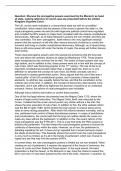Question: Discuss the prerogative powers exercised by the Monarch as head
of state, making reference to recent case law presented before the United
Kingdom Supreme Court.
The UK, as the name indicates is a monarchical state but with an uncodified
constitution, which means that the powers of the crown to govern the state i.e. the
royal prerogative powers do exist but with legal and political control have regulated
and curtailed the RPs powers to make them consistent with the mature constitutional
democracies. Although, as of today Monarch’s powers are very limited, and they are
very controlled. The term ‘prerogative’, itself refers to the very significant residual
powers that the monarch is left with after various amounts of reforms to control the
monarch and bring in a better constitutional democracy. Although, as of recent times,
there is still some power left under the hands of royals, this essay will further discuss
down below.
These royal prerogative powers were the special pre-eminence that the king had
over and above the ordinary citizens as stated by Blackstone 1765. These powers
were recognized by the common law as well. The extent of these powers was very
high before, and in addition to this, these powers were not in line with the concept of
rule of law, which was becoming popular in the 17 th century. The rule of law is an
important constitutional principle rather than a single legal rule, there is no one
definition to describe the concept of rule of law, but these concepts can be a
benchmark to assess government action. Dicey argued that the rule of law was a
‘central pillar’ of the UK constitutional system, and it consists of three essential
elements: no arbitrary law, equality before the law, and that the constitution is the
ordinary law of the land. In addition, the concept of democracy also became more
important, and it was difficult to legitimize the exercise of powers by an unelected
monarch. Hence, the reform of royal prerogatives was inevitable.
Although many reforms were taken to control these powers.
One of the first legal reforms documented was the Magna Carta 1215, where the
means of legal control took place. The Magna Carta, itself, was executed by the
Crown. It stated that the crown cannot punish any citizen without a fair trial- this
shows the slow execution of rule of law. In addition to this, the other earliest reform
was the Bill of rights 1689, which limited the king’s power to impose taxes and to
raise an army during peacetime. After which the reforms became normality, one by
one, parliament took control of these discretionary powers. In cases of prohibitions
and proclamations, the courts held that the king can neither decide the cases nor
make any laws without the parliament. In addition to this, the recent reform of the
royal prerogatives was the FTPA 2011. This is a law that limits the PM’s powers to
dissolve the parliament. This law limited the royal prerogative powers to ensure the
continuity of democracy within the state. However, as of now, the parliament is
debating repealing this act. It does end up repealed then it would seriously impact
the ideals of democracy. This basically shows that control over the royal prerogatives
is very much so limited, as it’s all in the hands of parliament, which can choose to
repeal any law that may limit the powers of RPs.
In current times, the role of prerogative powers is limited but not non-existent. When
creating an act of parliament, it requires the approval of the house of commons, the
house of Lords and then finally the Royal assent. In the royal assent, the basic
proposition is that the Queen, or the Monarch in law, have the choice to assent the
bill or not even if it has been passed by the rest of the lords. However, in practice, by




